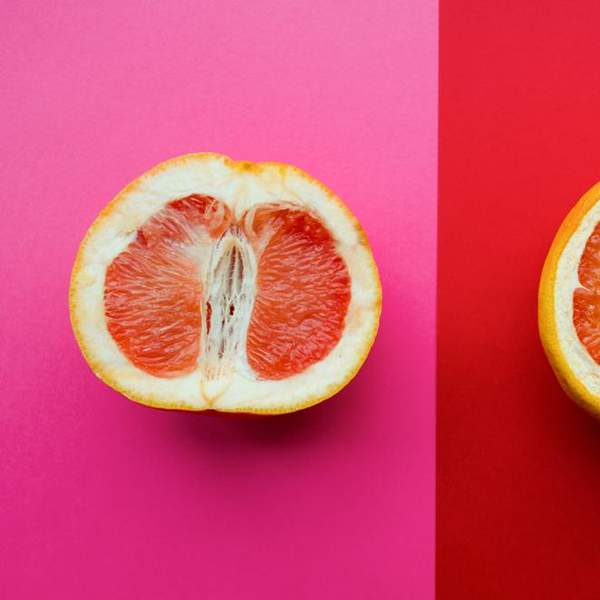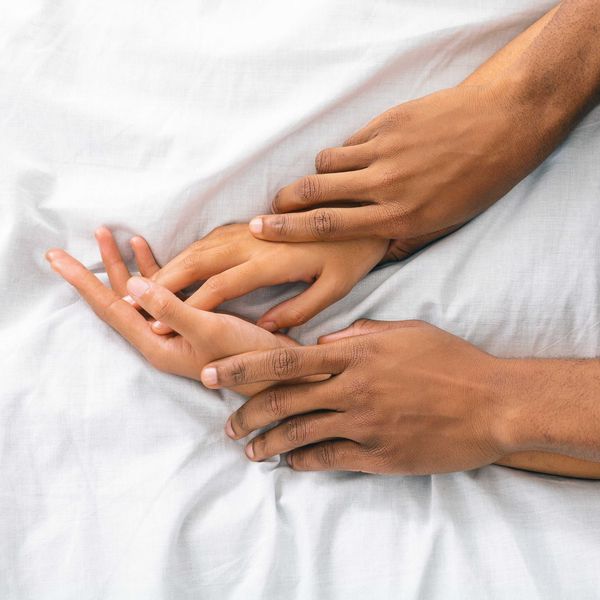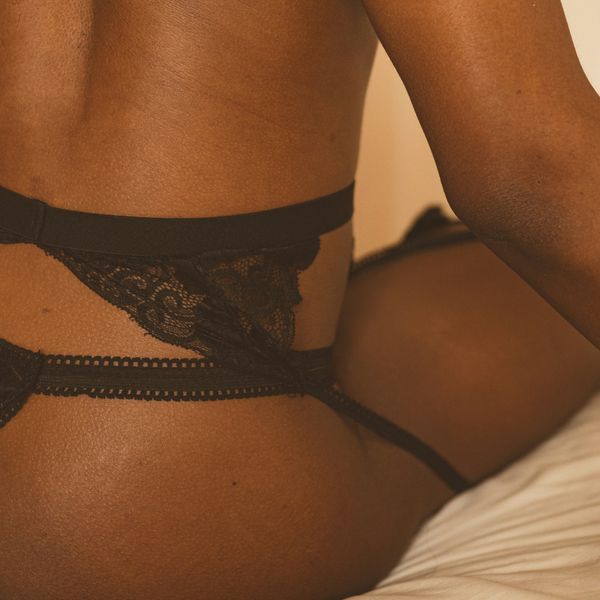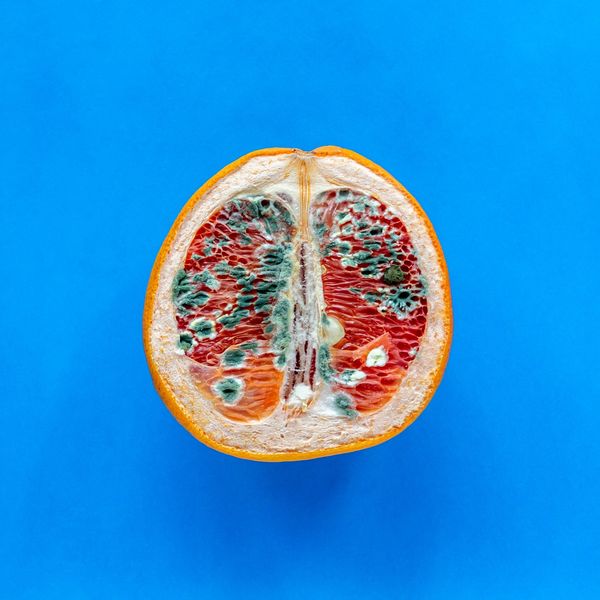Okay, let me put something right on out here first. The "extra sweet" that is in this title is more like a play on words when it comes to the next holiday that's on the horizon. We all know that it's Valentine's Day. The reason why I think it's important to get that out into the open is because I am so over all of these articles that try to imply that there is something that we can do to make our vagina taste like a pineapple smoothie or chocolate ice cream. Anyone who has told you that lied. BIG TIME.
How To Make Your Vagina Taste Good
However, there are definitely things that you can add to your daily routine that will cause your vagina (and vulva) to be fresher, less acidic and can provide a hint of sweetness. That's what we're gonna get into on this fine day.
So, if your plans for V-Day are to be your partner's sweet thang, here are some easy hacks that will make your partner enjoy you, on a whole 'nother level. Ready?
10 Ways To Make Your Vagina Taste 'Sweeter'
1. Avoid the Following Foods
Who hasn't heard that pineapple juice can make your vagina taste sweeter? Yes and no. Again, the reality is that our hot pocket wasn't created to taste like a fruit salad, no matter what we do—so it won't. With that said, it is true that our discharge/natural lubrication can somewhat shift in how acidic or salty it is, based on our diet. That's because what we eat does affect our mucosal secretions.
That's why it's a good idea to avoid foods with sulfur in them like onions and garlic (for self-explanatory reasons, I'm sure); sugary foods (because it can throw off your pH balance); dairy (it can suppress your immunity and also throw off your vagina's pH); asparagus (it makes urine and sometimes discharge smell) and red meat (it tends to be high in saturated fat which can lead to bacterial infections). Avoid them for how long? Eh, if you're planning on a lot of oral action for Valentine's Day, going without these, starting the Tuesday prior, is a safe bet.
2. Drink More Water
We're made up of 60-65 percent water which is why we need to drink it on a daily basis. Water is good for us because it flushes out toxins; regulates our body temperature; helps to keep us regular; strengthens our immunity; helps to keep us in a good mood; keeps us hydrated; reduces breakouts and helps us to produce more saliva and lubrication—both are important when it comes to fellatio and cunnilingus.
Also, since water helps to remove bacteria, this is another way to keep your vagina extra fresh from the inside out. It can only get better if that water has a few mint sprigs in it or if you decide to consume some infused water from time to time.
3. Try Some Kefir
I think I've shared before that I've got a fungal sensitivity. As a result, I have had a few more yeast infections (not just my vagina either; one time I had one underneath my breasts that was hellacious) than the average person, along with a couple of bouts of tinea versicolor. Anyway, the last time that I had a yeast infection and got prescribed an antibiotic, I knew that I needed to take some sort of probiotic because drugs tend to wipe out good and bad bacteria; probiotics restore the good that was lost (so that you don't end up with a yeast infection all over again).
Something that can help you with this is kefir which is basically a low-fat fermented milk. Before you turn up your nose, at the end of the day, it's pretty much drinkable yogurt. What makes kefir so good for you is it can help to control your blood sugar levels, lower your cholesterol, improve digestion, control your weight and, it's got antibacterial and antifungal properties that will keep your vagina in great health. Since adding kefir to my regular diet, I've noticed that my vagina smells even more pleasant. Some other consumers have told me that their partners can taste the difference, in the best way possible, too.
4. Lay Off of the Coffee and Alcohol
No matter how much you like java or wine, about 48 hours going into Valentine's Day, you should probably lay up off of both of them. As far as coffee goes, the caffeine in it can actually deplete vagina of the vitamins and minerals that it needs to remain healthy. Not only that but it has a way of altering the odor of your genitalia—and not in a good way. Alcohol? While on one hand, it can increase your libido, it also has a way of dehydrating your system as well. No one wants a dry va-jay-jay. So, try and chill on the liquor in the days leading up to V-Day. Have it on the actual day instead.
5. Snack on Some Celery
Celery doesn't taste like much of anything. I think we all can agree on that. Still, it's a really good idea to have some in your fridge so that you can chomp on a few stalks, at least a couple of times a week. On the health tip, it's 95 percent water (which means it can help to keep you hydrated while flushing out toxins). Plus, celery contains a good amount of vitamins A, C, and K.
Also, the magnesium, iron, and calcium in it can neutralize acids within your system. Plus, celery has a good amount of antioxidants and anti-inflammatory compounds. As far as your vagina goes, because celery does contain vitamin C, it's able to keep the bad bacteria at bay. Also, the chlorophyll in celery will make your va-jay-jay smell more pleasant too.
6. Take Some Cran-Cherry-Apple Shots
Nothing can make your vagina taste just like it. And there is absolutely nothing wrong with that. That said, there are some fruits that contain nutrients that can make our vagina a little more delightful and appealing. Cranberries are loaded with potent antioxidants that will keep your pH levels balanced. Bing cherries also have antioxidants as well as anti-inflammatory compounds. Apples are awesome because the phytoestrogen phloridzin and its antioxidants help to increase blood flow to your vaginal region while also increasing lubrication. Just imagine what a combination of this is (go with 100 percent juice; the extra sugary kind will work against you rather than for you).
7. Play with Some Frozen Grapes
Something that is super stimulating when it comes to sex is playing around with temperatures in the sense of going from warm to cold. On the cool tip, how about bringing some frozen grapes into the mix? Because grapes have a thin skin on them and they are made up of 82 percent water, your partner can tease you with them, all over your vaginal area, without worrying about whether they will irritate you days later.
I'm telling you, a frozen grape on your clitoral hood will feel amazing for you. Then you both sharing the grape will taste unbelievable to you both.
8. Don’t Forget About Coconut and Cinnamon Oil
Back when I was gettin' it in, you couldn't get me to not have a mixture of coconut oil and cinnamon oil on a bed stand somewhere. Coconut oil is dope because it contains properties to keep your vagina drama-feeling-free and it's able to safely dilute the potency of the cinnamon oil. Cinnamon oil is awesome because it provides a warming effect and the oil itself is cinnamon-y and sweet. For the skeptics, no it doesn't burn. Just make sure to keep the "less is more" approach in mind. Anyway, if you want a gift that keeps on giving, this is a combo that is pretty unmatched.
9. Cop Some Flavored Lube
If you're not ready to take the step of basically DIY-ing your own tasty lubricant, there are plenty of flavored ones on the market that are safe to use whether you're planning on using it for oral sex or…all things sex. If you want a lil' help choosing a brand that best suits your personal needs and desires, Let's Talk Sex reviewed 12 different ones. You can check 'em all out here.
10. Add Some Rosewater…to Your Bath Water
Did you know that rosewater has the ability to enhance the flavor of things? This is why it's sometimes an ingredient in different kinds of sauces and desserts. Since the properties in rosewater are also really good for you when it comes to things like treating infections, soothing your skin and improving your mood, I bet you can see why I added it to this list of ways to make your vagina sweeter.
Adding some rosewater to your bath water allows you to gently cleanse your vagina. Then, if you add a little bit of it to your outer labia before slipping into something sexy, your vagina will smell feminine and inviting—the perfect combination for a pretty sweet 'n sexy Valentine's Day evening, if you ask me. Enjoy. Both of you. #wink
Let’s make things inbox official! Sign up for the xoNecole newsletter for love, wellness, career, and exclusive content delivered straight to your inbox.
Featured image by Shutterstock
- Worst Foods For Your Vagina - xoNecole: Women's Interest, Love, Wellness, Beauty ›
- The Different Types Of Vaginas - xoNecole: Women's Interest, Love, Wellness, Beauty ›
- How To Increase Vaginal Lubrication Naturally - xoNecole: Women's Interest, Love, Wellness, Beauty ›
- What Your Vaginal Discharge Means - xoNecole: Women's Interest, Love, Wellness, Beauty ›
- Foods That Increase Vaginal Lubrication Naturally - xoNecole: Lifestyle, Culture, Love, & Wellness ›
- 12 Ways To Cool Down Your Vagina - xoNecole: Lifestyle, Culture, Love, Wellness ›
- The Best Fall Foods For Vaginal Health - xoNecole: Lifestyle, Culture, Love, Wellness ›
- New Year's Resolutions For Your Vagina - xoNecole ›















